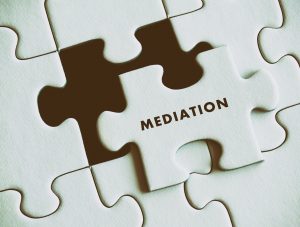Mediation
Our Mediation Service is delivered by a trained accredited (NMAS) Mediator. Mediation is designed to assist people open up a healthy dialogue about their areas of concern and move towards mutually agreeable solutions. This service is confidential and is provided by a neutral and impartial Mediator who will facilitate the discussions and use a range of skills including negotiation, effective listening, summarising and rephrasing to assist the participants to resolve their own issues and come to a mutually agreeable solution. If a resolution is reached the Mediator will draw up a confidential agreement for participants to sign. This service can be provided for independent participants or with their legal advisors present. In order for these services to be most effective, it is important that all parties are there voluntarily, in good faith, with a positive expectation that the matter will be able to be resolved.

Mediation can be facilitated face to face in one of our offices, or via video conferencing if required. Online mediation allows issues arising between people residing in different states to be resolved quickly without the need for travel. This can also be a good option where people feel uncomfortable being in the same room due to the nature of the disagreement.
Our Mediator specialises in workplace disagreements and resolution of barriers around return to work after an injury, however can also provide private mediation for other issues and disagreements. Mediation can be used to effectively resolve most disputes or interpersonal conflicts so long as the parties are willing to enter the process in good faith and have the authority to come to an agreement. If you are unsure if your situation is suitable for mediation, please feel free to get in touch to discuss further.
Benefits of Mediation:
- Confidentiality: All aspects of the mediation are confidential, so far as the law allows. The mediator, involved parties and any other attendees sign a confidentiality agreement.
- Self Efficacy: Mediation allows the parties to voice their concerns in a safe and supported environment. The mediator facilitates the discussion but does not offer solutions or make decisions. The parties are facilitated to generate their own options for resolution and come to a mutually beneficial agreement.
- Cost Effective: Resolving an issue through mediation costs far less than progressing to a legal dispute.
- Time Effective: Mediation can generally be arranged quickly and at a time that is mutually convenient to all parties. Often a dispute can be resolved in 1 or 2 sessions.
- Preserves Relationships: The focus of the mediation is to assist the parties to resolve the dispute through open communication. This can lead to a higher level of understanding and can improve future personal or professional relationships.
- Written Agreement: If a resolution is reached, this is recorded by the mediator in the form of a ‘good faith’ written agreement. If needed this can be made into a legally binding agreement by legal counsel.
What to Expect:
- Initial Contact: The Mediator will make contact with each party to introduce themselves and arrange the pre-mediation sessions.
- Pre-mediation: An initial confidential meeting with each party (either conducted in person or via video-link or phone) to gather information about the nature of the disagreement and the main issues of concern for each party in order to determine the suitability of progressing to mediation. During this session the Mediator will explain the process in detail and will go through the confidentiality agreement and provide each party with an agreement to mediate. All parties need to agree for the mediation to continue.
- A structured mediation session, facilitated by a trained mediator. This may be completed in one session, or multiple sessions may be needed. This follows the structure of: Introduction by the mediator; Opening Statement by each party; Reflection and generation of the Agenda, Exploration of the issues; Separate sessions where each party speaks privately with the mediator; Generation of options and alternatives; Coming to an agreement.
- Recording the agreement made on the day and having this agreement signed by both parties. This agreement is not legally binding, however can be easily converted by lawyers into a legally binding document if required.
Where our mediation services are referred by a third party (for example, a workplace requests mediation for two staff members) a brief report will be provided to the referring party, however this report will not divulge the confidential details discussed during the sessions, it will outline when sessions were attended, whether an agreement was made and any resulting recommendations. Any limitations on confidentiality will be discussed and agreed prior to moving forward with the mediation.
If you would like further information please contact us on (08) 8293 6783 and one of our friendly Admin staff will have our Mediator give you a call to discuss in more detail.

